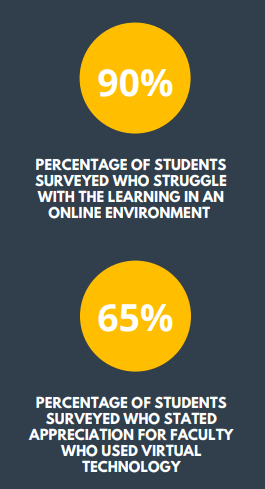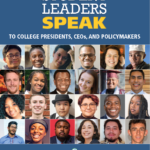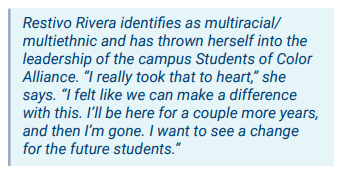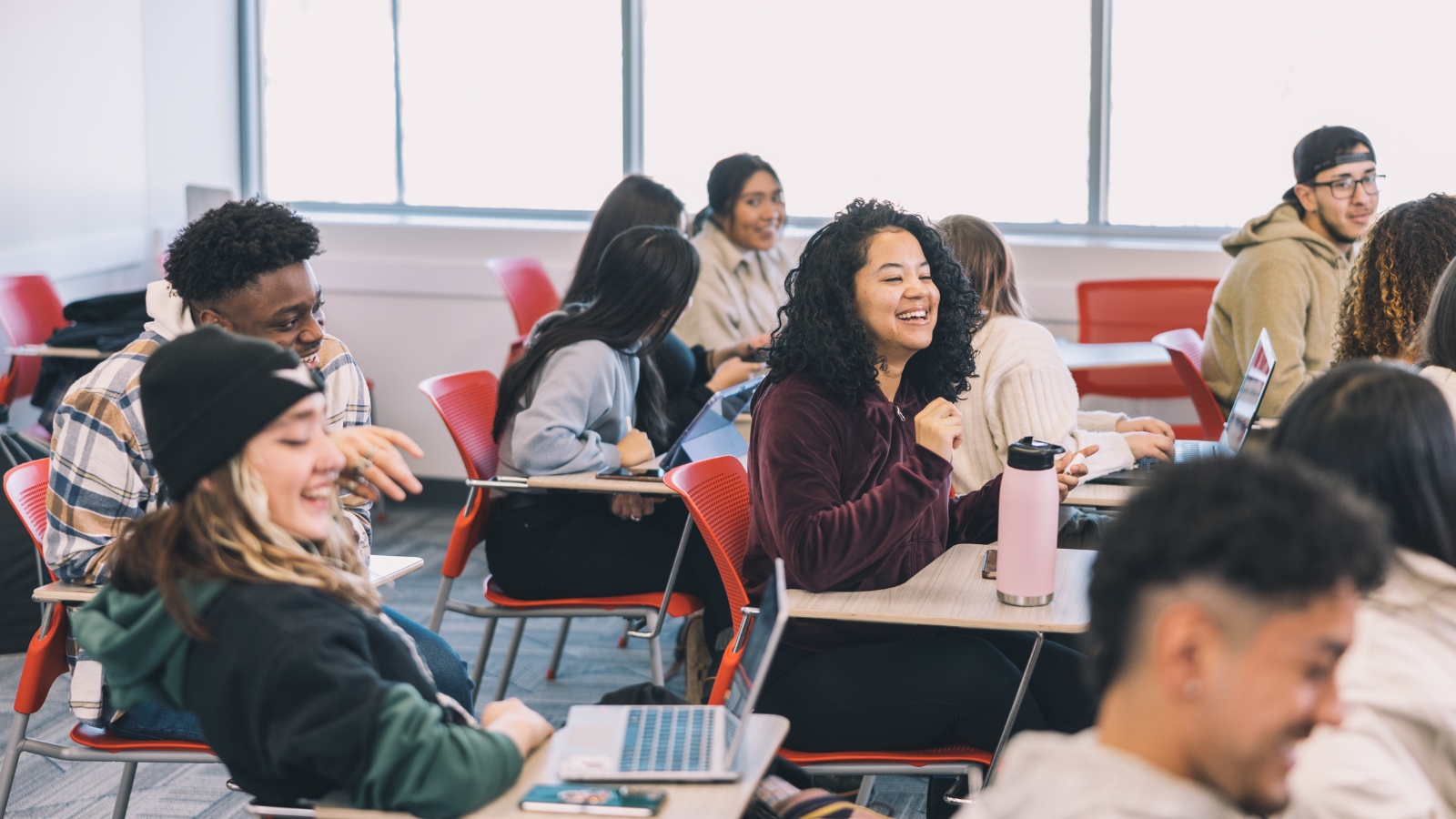College and university faculty devoted to equity and student care already know the importance of gathering student experiences to inform teaching practices, course policies, and institutional planning. When students have the opportunity to share their thoughts and lived experiences, they feel valued. This, in turn, can lead to increased engagement and motivation in the classroom.
Student-centered learning that draws on their experiences and perspectives helps ensure every student is included, but it doesn’t automatically do so. As we discussed previously, student data is of little value if it isn’t disaggregated data that helps readers understand how specific groups of students experience higher education differently.
To support faculty seeking more student perspective and data about student experiences, we’ve gathered the following list of high-quality student surveys, many of which also include qualitative interviews. We particularly sought out student surveys that illuminate experiences with digital learning.
We intend to maintain and update this list as new examples of surveys featuring student experiences are published. Please contact us if you have one to recommend.
Student Voice Collection from Inside Higher Ed
Inside Higher Ed publishes an occasional series of surveys of students in collaboration with College Pulse called the Student Voice Collection. The series explores a different topic every month, such as teaching practices, grading, course materials, mental health, student services, and digital learning.
Students and Academic Life: Top Ten Insights
This survey of 3,004 two- and four-year college students found that:
- more than half struggled with a teaching style that didn’t work for them;
- more than half said that being more flexible with deadlines would promote their academic success;
- 4 in 10 said that unclear expectations negatively affect their success; and
- one-quarter wanted even their in-person classes to have some online sessions.
How College Students Say They Learn Best
This survey of 1,250 undergraduates looked at which class formats and active learning methods contributed to successful learning. Three key takeaways:
- More than a third of the students said they learn best through interactive lectures.
- A quarter of the students said they prefer traditional lectures.
- Nearly a quarter said they prefer classes heavy on active learning, including individual and group activities.
Student Speak series from Every Learner Everywhere
Every Learner Everywhere occasionally sponsors, collaborates on, or produces with its network partners surveys that feature student experiences. These surveys are all designed to include both two-year and four-year colleges and the experiences of minoritized, first-generation, and poverty-affected students.
Student Speak was a series of three surveys conducted in 2020 and 2021. The project was developed in partnership with GlobalMindedED and The Equity Project. The first was based on facilitated focus group interviews, and that was followed up with two more conducted by student ambassadors surveying and interviewing their peers. Many of the questions and responses were influenced by the early days of the COVID-19 pandemic.
Student Speak 2020: Student Voices Informing Educational Voices
This provided a national snapshot of diverse college students from over 40 institutions, including many who are first generation. The summary includes numerous specific recommendations for administrators, faculty, and support staff. Key findings included:
- 90 percent of students were comfortable using technology in the classroom, but 80 percent disliked their online learning experiences.
- 70 percent took advantage of support apart from their instructor.
Sample quote: “When teachers provide lots of different learning options and opportunities in the remote learning world, things are so much better. Everyone doesn’t learn the same.”
Student Speak 2020: Peer-to-Peer Survey Results
 Twenty-five student ambassadors interviewed peers at 21 U.S. colleges and universities about digital learning, social climate, police violence, and issues facing first-generation and Pell-eligible students. The student ambassadors collected 270 responses from their peers. Key findings showed that:
Twenty-five student ambassadors interviewed peers at 21 U.S. colleges and universities about digital learning, social climate, police violence, and issues facing first-generation and Pell-eligible students. The student ambassadors collected 270 responses from their peers. Key findings showed that:
- 90 percent of students struggled with online learning but 65 percent also appreciated faculty who used it.
- 88 percent did not think digital learning tools were created with equity in mind.
- 70 percent cited mental health concerns or struggles.
Sample quote: “I think that digital learning tools are not inclusive. I think there are many people who do not have the privilege to have devices or the internet to use these tools.”
Student Leaders Speak to College Presidents, CEOs, and Policymakers
 This report, based on an additional 102 surveys, features in-depth interviews with five first-generation students sharing their personal stories and their career hopes.
This report, based on an additional 102 surveys, features in-depth interviews with five first-generation students sharing their personal stories and their career hopes.
Sample quote: “Coming from a low-income household in a rural community, I did not understand the need for a computer until college. By then, I had a lot of catching up to do.”
Other Every Learner Everywhere resources featuring student perspectives
What Our Best College Instructors Do: Reflections By Students About Meaningful Learning Experiences
This survey asks 22 students from a range of institutions about what they believe represents effective, equitable, and inclusive college teaching. The three top takeaways in the report summary are:
- Students want to be recognized as individuals and appreciated in the classroom.
- Students value the connections instructors make between course content and “real life.”
- Students want to be treated with respect and trust.
Sample quote: “I was able to use my own skills and passions and combine [them] into an assignment on a fascinating but predetermined subject. Other students recited poems, sang songs, did hypothetical podcast interviews, wrote magazine articles, etc. The point is, we all got to insert ourselves into our assignment and in a way that we were comfortable with. . . . For the first time, I truly felt like I was a part of something greater than a grade and learned the true value of learning new concepts.”
 While this report doesn’t involve an original quantitative survey, it is based on structured interviews with students (and other educational leaders) whose perspectives are featured prominently throughout. The report synthesizes commentary, research, surveys and programmatic activity on how higher education has grappled with disaggregating and using student data to confront and close equity gaps for particular student populations.
While this report doesn’t involve an original quantitative survey, it is based on structured interviews with students (and other educational leaders) whose perspectives are featured prominently throughout. The report synthesizes commentary, research, surveys and programmatic activity on how higher education has grappled with disaggregating and using student data to confront and close equity gaps for particular student populations.
Sample quote: “Sometimes the way [faculty] address students is like they’re 17-year-olds. No mother who has raised three children wants to be treated like a girl who doesn’t know any better. I could be ignorant of certain things in college, but teach me. Don’t talk down or make students feel like they’re less because they don’t know.”
Suddenly Online: A National Undergraduate Survey
Produced in partnership with Digital Promise and Tyton Partners, this survey of 1,008 students was fielded to learn about the impacts of the shift to emergency remote learning during the COVID-19 pandemic. With a few years’ distance from that crisis period, readers may be surprised that student satisfaction with their courses remained somewhat stable. One big challenge that was noted frequently was self-motivation.
Sample quote: “The greatest challenge was finding the motivation to get out of bed and complete assignments. It’s not the same as getting up, getting ready, driving to class, then sitting in class to learn.”
Center for Community College Student Engagement
The Center for Community College Student Engagement (CCCSE) at the University of Texas works with hundreds of community colleges to administer surveys that are linked to student success. Their website is a rich resource for instructors seeking student experiences and their role in improving teaching, particularly the organization’s page for publications and resources.
The Online Student: Impact of Course Modality on Engagement
This survey of 82,824 students at 181 institutions of higher learning compared the learning and engagement experiences of online-only students with students who do not take online courses exclusively.
It found that online students were less likely to engage with faculty and peers, experience applied learning opportunities, or use tutoring and support services. However, online students were less likely to skip class or to be unprepared for class. Online-only students were much more likely to be non-traditional age, female, and working parents.
Many of the interviews suggest online-only students don’t enjoy the experience but find it’s their only practical option for degree progress.
Sample quote: “I believe that online learning—it takes a person that will be able to get out of the bed in the morning and be driven and go do it. It’s not handed to you.”
Listen to Me: Community College Students Tell Us What Helps Them Persist
The longitudinal focus groups with first-year students in this report illuminate the challenges of retention and attrition in community colleges. It features numerous individual students describing the path through orientation, registration, advising, learning, and, unfortunately, sometimes dropping out.
Sample quote: “After I left, nobody said anything. Nobody emailed me or messaged me. I wanted to actually go and talk to my teachers . . . and I wanted to, like, apologize and thank them for being patient with me and, like, working with me . . . but I never got the courage to. I just felt like there was no need for that because in a way I felt like I wasted their time.”
Equity-centered student survey instrument
 For faculty who wish to conduct their own student survey, the Every Learner Everywhere network, in collaboration with Digital Promise, created an Equity in Digital Learning Student Survey available for download. The questions in this survey instrument focus on digital learning and equity issues. The tool was used by the network to sample more than 6,000 students over the 2021-2022 academic year. The tool also includes analysis and guidance on how best to adapt the survey for your institution or classroom.
For faculty who wish to conduct their own student survey, the Every Learner Everywhere network, in collaboration with Digital Promise, created an Equity in Digital Learning Student Survey available for download. The questions in this survey instrument focus on digital learning and equity issues. The tool was used by the network to sample more than 6,000 students over the 2021-2022 academic year. The tool also includes analysis and guidance on how best to adapt the survey for your institution or classroom.


